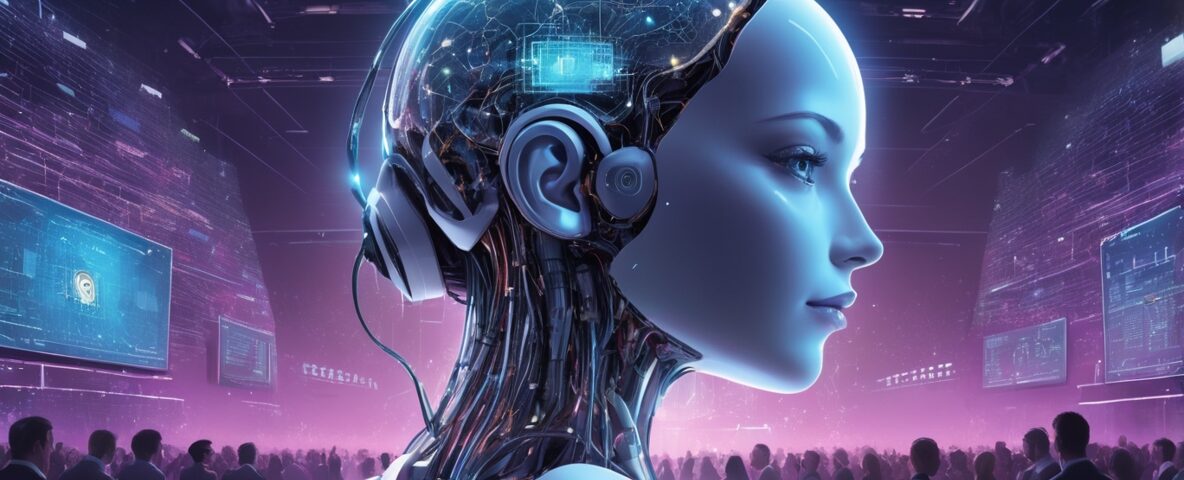
Optimizing Supply Chain Marketing with AI Insights
March 20, 2025
Using AI to Reduce Churn in Subscription-Based Models
March 21, 2025Artificial Intelligence (AI) is revolutionizing the event marketing industry, streamlining tasks, improving attendee experiences, and maximizing event success. From planning and promotion to execution and post-event analytics, AI-powered tools enhance efficiency, optimize decision-making, and deliver personalized experiences at scale.
In this article, we’ll explore how AI is transforming event marketing at every stage, from planning and execution to post-event analysis, providing insights into best practices and future trends.

AI in Event Planning
Automating Venue Selection and Booking
AI-driven platforms help event organizers select the perfect venue based on historical data, attendee preferences, and budget constraints. Tools like AI-powered event management software analyze past events and recommend optimal locations, saving time and reducing costs.
AI-Powered Audience Targeting & Personalization
AI analyzes demographic and behavioral data to identify the right audience for an event. By leveraging machine learning, event marketers can create highly targeted promotions and personalized invitations, ensuring maximum engagement.
Chatbots for Event Registration & Assistance
AI-powered chatbots streamline event registration by providing real-time assistance, answering FAQs, and guiding attendees through the sign-up process. These chatbots enhance user experience while reducing the workload for event organizers.

AI-Driven Marketing Strategies
AI-Powered Content Creation & Distribution
AI tools generate engaging promotional content, from blog posts to social media updates. Platforms like ChatGPT and Jasper create high-quality marketing copy tailored to audience preferences.
Automated Email & Social Media Campaigns
AI-driven marketing automation tools, such as HubSpot and Marketo, personalize email campaigns, optimize subject lines, and analyze audience responses to maximize open rates and conversions.
Predictive Analytics for Marketing Success
Predictive AI models analyze past marketing performance to forecast which strategies will yield the best results, allowing event planners to allocate resources effectively.

Enhancing Attendee Engagement with AI
AI-Powered Networking & Matchmaking
AI-driven networking platforms use machine learning to match attendees with similar interests, optimizing connections and fostering meaningful interactions.
Voice Assistants & Chatbots for On-Site Engagement
Smart assistants provide real-time event updates, answer queries, and guide attendees to sessions, reducing confusion and improving event flow.
Augmented Reality (AR) & Virtual Reality (VR) Experiences
AI-enhanced AR and VR experiences offer immersive event interactions, from virtual booths to interactive product demos, elevating engagement levels.

AI in Event Execution
Facial Recognition for Check-ins & Security
AI-powered facial recognition speeds up event check-ins, enhances security, and minimizes unauthorized access.
Real-Time Crowd Monitoring & Management
AI systems analyze crowd density, detecting congestion areas and helping organizers adjust seating arrangements or direct foot traffic dynamically.
AI-Driven Smart Scheduling & Notifications
AI optimizes event schedules based on attendee preferences, minimizing conflicts and sending personalized reminders for sessions of interest.

AI in Post-Event Analysis
Sentiment Analysis & Attendee Feedback Processing
AI processes attendee feedback from surveys, social media, and reviews, identifying trends and areas for improvement.
AI-Powered Data Analytics for Event ROI
Machine learning models analyze key performance indicators (KPIs) such as attendance rates, engagement levels, and conversion metrics to assess event success.
Post-Event Personalization & Follow-Ups
AI automates follow-up emails and suggests personalized content based on attendee interactions, strengthening long-term relationships.

Case Studies: AI Success Stories in Event Marketing
- Salesforce’s AI-Driven Dreamforce Event: AI-powered chatbots handled attendee queries, and predictive analytics optimized event logistics.
- CES and Facial Recognition: The world’s largest tech event used AI facial recognition for seamless entry and improved security.
- IBM Watson at Conferences: AI analyzed attendee interests and suggested relevant networking opportunities.

The Future of AI in Event Marketing
The future of AI in event marketing is promising, with advancements in real-time personalization, AI-generated event content, and AI-powered virtual event assistants. Hybrid and virtual events will benefit from AI’s ability to analyze digital interactions and tailor experiences accordingly.
Conclusion
AI is reshaping event marketing by enhancing planning, execution, and post-event analysis. By integrating AI-powered tools, event organizers can streamline operations, improve attendee engagement, and maximize ROI. As AI technology continues to evolve, its role in event marketing will only become more indispensable.


